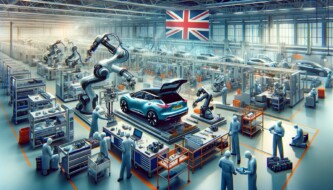Nissan and its partners have announced a £2bn investment plan to build three electric car models at its Sunderland factory in the UK. The Japanese company will produce electric Qashqai and Juke models, as well as the next generation of the electric Leaf, at the plant. This investment is expected to preserve the jobs of around 6,000 workers directly, and thousands more across the country. In addition to the car plant, a new battery plant, known as a “gigafactory,” will also be required. Nissan will spend £1.12bn on preparing its UK facilities and supply chain for the new models and training its workforce. The total new investment, including the gigafactory, will be up to £2bn.
The chairman of AESC, Nissan’s partner, has stated that a feasibility study on expanding the gigafactory operations in Sunderland has been launched. It is expected to receive government support, although the details have not been disclosed. Nissan has confirmed that it will receive £15m in funding for its research center in Bedfordshire. The Unite union has praised the plan for securing the long-term future of the site and the skilled jobs it supports but has called for more government support for the car industry.
Earlier this year, Nissan’s chief operating officer expressed concerns about the UK’s competitiveness in the car-making industry due to higher manufacturing costs, including energy bills and inflation. However, Alan Johnson, Nissan’s senior vice president of manufacturing and supply chain, believes that the UK can be a competitive place for car production if all the necessary factors, such as energy costs, infrastructure, and government support, are in place.
The UK government has provided support for Nissan through the Automotive Transformation Fund, and discussions are ongoing regarding further funding. The government’s contribution to Nissan’s project is estimated to be around £100m. Nissan’s announcement coincides with the confirmation of an investment zone for North East England, which is expected to create over 4,000 jobs in the next five years.
Brexit has also been a concern for the car manufacturing industry, with potential tariffs on cars sold between the UK and EU. Nissan exports 80% of the vehicles made at its Sunderland plant, making exportation critical to its success. The company believes that having major investments, such as battery production, in the UK is key to its strategy. Other car manufacturers, such as Stellantis, have also expressed concerns about the tariffs and the sustainability of their operations in the UK.
In conclusion, Nissan’s £2bn investment plan to build electric car models at its Sunderland factory is expected to preserve thousands of jobs and boost the UK’s car manufacturing industry. The plan includes the construction of a new battery plant, and discussions with the government regarding funding are ongoing. Brexit and potential tariffs on car exports remain a concern for the industry, but Nissan believes that having major investments in the UK is crucial for its success.
Original news source: Nissan to lead £2bn investment in UK electric car plant (BBC)
Listen
Slow
Normal
Fast
Group or Classroom Activities
Warm-up Activities:
– News Summary
Instructions: In pairs or small groups, have students read the article and summarize the main points in their own words. Each group will then present their summary to the class, and the class can discuss any key details they may have missed.
– Opinion Poll
Instructions: Divide the class into two groups: one in favor of Nissan’s investment plan and one against it. Each group will have a few minutes to brainstorm arguments supporting their position. Then, conduct a class-wide opinion poll where students vote on whether they support or oppose the investment plan. Afterward, students can discuss their reasons and engage in a debate.
– Vocabulary Pictionary
Instructions: Write down key vocabulary words from the article on separate pieces of paper. Divide the class into teams and have them take turns drawing a word and having their team guess what it is. This activity will help reinforce the vocabulary used in the article and encourage students to think creatively.
– Keyword Hangman
Instructions: Choose important keywords from the article and write blanks on the board to represent the letters in each word. Students take turns guessing letters to try and fill in the blanks and uncover the keywords. This activity will help students practice spelling and reinforce their understanding of the article.
– Future Predictions
Instructions: In pairs or small groups, have students discuss and make predictions about the future of the car manufacturing industry in the UK. They can consider factors such as Brexit, technological advancements, and environmental concerns. Each group can then present their predictions to the class and engage in a discussion about the possibilities.
Comprehension Questions:
1. What are the three electric car models that Nissan plans to build at its Sunderland factory?
2. How many jobs are expected to be preserved as a result of Nissan’s investment plan?
3. What is the name of the new battery plant that will be constructed?
4. How much will Nissan spend on preparing its UK facilities and supply chain for the new models?
5. What government support is Nissan’s gigafactory expected to receive?
6. How much funding will Nissan receive for its research center in Bedfordshire?
7. What concerns did Nissan’s chief operating officer express about the UK’s competitiveness in the car-making industry?
8. Why does Nissan believe that having major investments in the UK is crucial for its success?
Go to answers ⇩
Listen and Fill in the Gaps:
Nissan and its (1)______s have announced a £2bn investment plan to build three (2)______ car models at its Sunderland (3)______ in the UK. The Japanese company will produce electric Qashqai and Juke models, as well as the next generation of the electric Leaf, at the plant. This investment is expected to preserve the jobs of around 6,000 workers directly, and thousands more across the country. In addition to the car plant, a new battery plant, known as a “gigafactory,” will also be required. Nissan will spend £1.12bn on (4)______ its UK facilities and supply chain for the new models and training its workforce. The total new investment, including the gigafactory, will be up to £2bn.
The chairman of AESC, Nissan’s partner, has stated that a feasibility study on expanding the gigafactory operations in Sunderland has been (5)______. It is expected to receive government support, although the details have not been disclosed. Nissan has confirmed that it will receive £15m in funding for its research center in Bedfordshire. The Unite union has praised the plan for securing the long-term (6)______ of the site and the skilled jobs it supports but has called for more government support for the car industry.
Earlier this year, Nissan’s chief operating officer expressed concerns about the UK’s competitiveness in the car-making industry due to higher manufacturing costs, including energy bills and inflation. However, Alan Johnson, Nissan’s (7)______ vice president of manufacturing and (8)______ chain, believes that the UK can be a (9)______ place for car production if all the necessary factors, such as energy costs, infrastructure, and (10)______ (11)______, are in place.
The UK government has provided support for (12)______ through the Automotive Transformation Fund, and discussions are ongoing regarding further funding. The government’s contribution to Nissan’s project is estimated to be around £100m. Nissan’s announcement coincides with the confirmation of an investment zone for North East England, which is expected to create over 4,000 jobs in the next five years.
Brexit has also been a concern for the car manufacturing industry, with potential tariffs on cars sold between the UK and EU. Nissan exports 80% of the vehicles made at its Sunderland plant, making exportation critical to its success. The (13)______ believes that (14)______ major investments, such as battery production, in the UK is key to its strategy. Other car manufacturers, such as Stellantis, have also expressed concerns about the tariffs and the sustainability of their operations in the UK.
In conclusion, Nissan’s £2bn investment plan to build electric car (15)______ at its Sunderland factory is expected to preserve thousands of jobs and boost the UK’s car manufacturing industry. The plan includes the construction of a new battery (16)______, and discussions with the government regarding funding are ongoing. Brexit and potential tariffs on car exports remain a concern for the industry, but Nissan believes that having major investments in the UK is crucial for its success.
Go to answers ⇩
Discussion Questions:
Students can ask a partner these questions, or discuss them as a group.
1. What is a “gigafactory” and why is it important for Nissan’s investment plan?
2. How would you feel if you were one of the workers at the Sunderland factory whose jobs were preserved by this investment?
3. Do you like the idea of electric cars becoming more common? Why or why not?
4. Do you think the UK government should provide more support for the car industry? Why or why not?
5. What factors do you think are necessary for the UK to be a competitive place for car production?
6. How do you think potential tariffs on car exports due to Brexit could impact Nissan’s operations in the UK?
7. Why do you think Nissan believes having major investments in the UK is crucial for its success?
8. What other concerns do you think car manufacturers may have about the sustainability of their operations in the UK?
9. How do you think the construction of a new battery plant will benefit Nissan’s electric car production?
10. What do you think the government’s role should be in supporting industries like car manufacturing?
11. How do you think higher manufacturing costs, such as energy bills and inflation, impact the competitiveness of the UK’s car-making industry?
12. Why do you think the Unite union praised the investment plan for securing skilled jobs?
13. How do you think the investment zone for North East England will impact the local economy?
14. Do you think electric cars will become more popular in the future? Why or why not?
15. How do you think the investment plan will impact the perception of the UK’s car manufacturing industry on a global scale?
Individual Activities
Vocabulary Meanings:
Match each word to its meaning.
Words:
1. Nissan
2. investment
3. electric
4. car
5. Sunderland
6. factory
7. UK
8. jobs
Meanings:
(a) Japanese automobile manufacturer
(b) Powered by electricity
(c) City in England where the factory is located
(d) Facility where goods are produced
(e) Positions of employment or work
(f) United Kingdom
(g) Allocation of money or resources for future gain
(h) Vehicle used for transportation
Go to answers ⇩
Multiple Choice Questions:
1. What is Nissan’s investment plan for its Sunderland factory in the UK?
(a) £1.12bn investment to build a new battery plant
(b) £15m investment for a research center in Bedfordshire
(c) £100m investment from the UK government
(d) £2bn investment to build three electric car models
2. Which electric car models will Nissan produce at its Sunderland factory?
(a) Micra, X-Trail, and the next generation of the Leaf
(b) Qashqai, Juke, and the next generation of the Rogue
(c) Micra, X-Trail, and the next generation of the Rogue
(d) Qashqai, Juke, and the next generation of the Leaf
3. How many jobs are expected to be preserved directly by Nissan’s investment?
(a) Around 4,000
(b) Around 8,000
(c) Around 6,000
(d) Around 10,000
4. What type of plant will be constructed as part of Nissan’s investment plan?
(a) A battery plant (gigafactory)
(b) A manufacturing plant
(c) A research and development center
(d) A distribution center
5. Which partner of Nissan has launched a feasibility study on expanding the gigafactory operations?
(a) Stellantis
(b) AESC
(c) Unite union
(d) UK government
6. What concerns did Nissan’s chief operating officer express about the UK’s competitiveness in the car-making industry?
(a) Higher manufacturing costs, including energy bills and inflation
(b) Lack of skilled workforce
(c) Lack of government support
(d) Brexit and potential tariffs
7. How much funding will Nissan receive for its research center in Bedfordshire?
(a) £100m
(b) £15m
(c) £2bn
(d) Funding details have not been disclosed
8. What is a concern for the car manufacturing industry regarding Brexit?
(a) Higher manufacturing costs in the UK
(b) Lack of government support for the industry
(c) Potential tariffs on car exports between the UK and EU
(d) Lack of skilled workforce in the UK
Go to answers ⇩
True or False Questions:
1. The investment is expected to preserve the jobs of around 6,000 workers directly and thousands more across the country.
2. Nissan and its partners are not investing £2bn to build three electric car models at its Sunderland factory in the UK.
3. Nissan will not spend £1.12bn on preparing its UK facilities and supply chain for the new models and training its workforce.
4. The UK government has provided support for Nissan through the Automotive Transformation Fund, with discussions ongoing for further funding.
5. Nissan will receive £15m in funding for its research center in Bedfordshire.
6. A feasibility study on reducing the gigafactory operations in Sunderland has been launched.
7. Nissan will not produce electric Qashqai and Juke models, as well as the next generation of the electric Leaf, at the plant.
8. The investment includes the construction of a new battery plant, known as a “gigafactory.”
Go to answers ⇩
Write a Summary:
Write a summary of this news article in two sentences.
Check your writing now with the best free AI for English writing!
Writing Questions:
Answer the following questions. Write as much as you can for each answer.
Check your answers with our free English writing assistant!
1. What models will Nissan produce at its Sunderland factory as part of the £2bn investment plan?
2. How many jobs are expected to be preserved as a result of Nissan’s investment?
3. What additional facility will be required as part of the investment plan?
4. How much funding will Nissan receive for its research center in Bedfordshire?
5. What concerns does Nissan have regarding the UK’s competitiveness in the car-making industry?
Answers
Comprehension Question Answers:
1. What are the three electric car models that Nissan plans to build at its Sunderland factory?
– The three electric car models that Nissan plans to build at its Sunderland factory are the Qashqai, Juke, and the next generation of the Leaf.
2. How many jobs are expected to be preserved as a result of Nissan’s investment plan?
– The investment plan is expected to preserve the jobs of around 6,000 workers directly, and thousands more across the country.
3. What is the name of the new battery plant that will be constructed?
– The new battery plant that will be constructed is known as a “gigafactory.”
4. How much will Nissan spend on preparing its UK facilities and supply chain for the new models?
– Nissan will spend £1.12bn on preparing its UK facilities and supply chain for the new models.
5. What government support is Nissan’s gigafactory expected to receive?
– The details of the government support for Nissan’s gigafactory have not been disclosed, but it is expected to receive support.
6. How much funding will Nissan receive for its research center in Bedfordshire?
– Nissan will receive £15m in funding for its research center in Bedfordshire.
7. What concerns did Nissan’s chief operating officer express about the UK’s competitiveness in the car-making industry?
– Nissan’s chief operating officer expressed concerns about the UK’s competitiveness in the car-making industry due to higher manufacturing costs, including energy bills and inflation.
8. Why does Nissan believe that having major investments in the UK is crucial for its success?
– Nissan believes that having major investments, such as battery production, in the UK is crucial for its success because it allows the company to be competitive in the car production industry if all the necessary factors, such as energy costs, infrastructure, and government support, are in place.
Go back to questions ⇧
Listen and Fill in the Gaps Answers:
(1) partner
(2) electric
(3) factory
(4) preparing
(5) launched
(6) future
(7) senior
(8) supply
(9) competitive
(10) government
(11) support
(12) Nissan
(13) company
(14) having
(15) models
(16) plant
Go back to questions ⇧
Vocabulary Meanings Answers:
1. Nissan
Answer: (a) Japanese automobile manufacturer
2. investment
Answer: (g) Allocation of money or resources for future gain
3. electric
Answer: (b) Powered by electricity
4. car
Answer: (h) Vehicle used for transportation
5. Sunderland
Answer: (c) City in England where the factory is located
6. factory
Answer: (d) Facility where goods are produced
7. UK
Answer: (f) United Kingdom
8. jobs
Answer: (e) Positions of employment or work
Go back to questions ⇧
Multiple Choice Answers:
1. What is Nissan’s investment plan for its Sunderland factory in the UK?
Answer: (d) £2bn investment to build three electric car models
2. Which electric car models will Nissan produce at its Sunderland factory?
Answer: (d) Qashqai, Juke, and the next generation of the Leaf
3. How many jobs are expected to be preserved directly by Nissan’s investment?
Answer: (c) Around 6,000
4. What type of plant will be constructed as part of Nissan’s investment plan?
Answer: (a) A battery plant (gigafactory)
5. Which partner of Nissan has launched a feasibility study on expanding the gigafactory operations?
Answer: (b) AESC
6. What concerns did Nissan’s chief operating officer express about the UK’s competitiveness in the car-making industry?
Answer: (a) Higher manufacturing costs, including energy bills and inflation
7. How much funding will Nissan receive for its research center in Bedfordshire?
Answer: (b) £15m
8. What is a concern for the car manufacturing industry regarding Brexit?
Answer: (c) Potential tariffs on car exports between the UK and EU
Go back to questions ⇧
True or False Answers:
1. The investment is expected to preserve the jobs of around 6,000 workers directly and thousands more across the country. (Answer: True)
2. Nissan and its partners are not investing £2bn to build three electric car models at its Sunderland factory in the UK. (Answer: False)
3. Nissan will not spend £1.12bn on preparing its UK facilities and supply chain for the new models and training its workforce. (Answer: False)
4. The UK government has provided support for Nissan through the Automotive Transformation Fund, with discussions ongoing for further funding. (Answer: True)
5. Nissan will receive £15m in funding for its research center in Bedfordshire. (Answer: True)
6. A feasibility study on reducing the gigafactory operations in Sunderland has been launched. (Answer: False)
7. Nissan will not produce electric Qashqai and Juke models, as well as the next generation of the electric Leaf, at the plant. (Answer: False)
8. The investment includes the construction of a new battery plant, known as a “gigafactory.” (Answer: True)
Go back to questions ⇧















